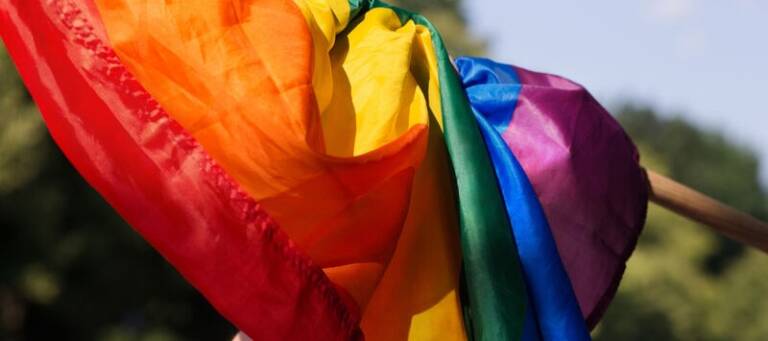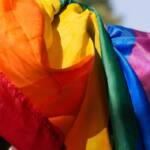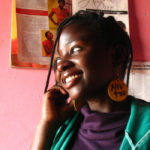“We are being targeted”
The Ugandan „Anti-Homosexuality Act“ leads to discrimination, harassment, blackmail and violations of rights of LGBTIQ persons and sex workers from the police as well as from communities.
In May 2023, Uganda’s president Yoweri Kaguta Museveni signed into law the “Anti-Homosexuality Act”. We talked to Alex* (*pseudonym), Executive Director of a Ugandan NGO, about the impact of this law on LGBTIQ persons, on civil society and on the HIV/AIDS response.
Dear Alex, you work for a Network and NGO which advocates for women’s rights and women’s health in the context of climate change and for sexual and reproductive health and rights of women and girls. Could you present your NGO to our readers?
Our network is a women’s rights organization and a network of several hundred individual members and more than 30 groups both registered and unregistered, including LGBTIQ, sex workers, refugees and lawyers.
Founded about ten years ago to enhance the status and visibility of women, girls and LGBTIQ and to fight for climate justice, health, human rights and economic empowerment, our NGO is operating country wide.
We have twelve full time staff members and two volunteers who are running the daily activities of the organization.
Our network addresses issues of climate change, women’s Health, and economic self-sufficiency through advocacy, skills development, provision of health services and practicing climate smart agriculture, among other interventions.
We have a long track record of implementing successful projects in Uganda including HIV prevention among key populations in consideration with the principles of “leaving no one behind” and “nothing about us without us.”
Through membership contribution and funding from our donors we have managed to serve marginalized rural women, LGBTIQ and sex workers, and through our networks and individual members we have managed to identify and solve challenges being faced by key populations in Uganda.
What are the main gender gaps and inequalities concerning girls and women in Uganda?
Gender inequalities limit the ability of women and girls to fully participate in, and benefit from development programs in Uganda. Formal and informal institutions, such as patriarchy, religion, family, marriage as well as social and cultural practices play a major role in perpetuating gender inequalities in Uganda. Prominent in perpetuating these inequalities are the glaring differences in asset ownership – especially when it comes to land ownership, women are left behind, and when we look at employment opportunities for women and men, women have limited chances compared to men.
Gender inequality and discrimination rob women and girls of their fundamental human rights
Alex*, Executive Director of a NGO in Uganda
In Uganda, six in seven new HIV infections among adolescents aged 15–19 years are among girls. Young women aged 15–24 years are twice as likely to be living with HIV than men.
High HIV prevalence among women is driven by gender inequality and discrimination, which robs women and girls of their fundamental human rights, including the right to education, health and economic opportunities. The resulting disempowerment also denies women and girls sexual autonomy, decision-making power, dignity and safety. Gender-based violence (GBV) is among the most egregious manifestation of gender inequality: it has been shown to increase the risk of acquiring HIV infection for women and girls, and among women living with HIV, it can lead to reduced access and adherence to treatment.
How is the general situation concerning HIV and AIDS in Uganda? What’s the strategy of the government and how is it implemented locally?
The prevalence of HIV among adults aged 15 to 64 in Uganda was 6.2% in 2017: 7.6% among females and 4.7% among males. This corresponds to approximately 1.2 million people aged 15 to 64 living with HIV in Uganda. According to data from the World Bank, this prevalence has fallen to 5.2% in 2021, whereas women’s share of population ages 15+ living with HIV has risen from 62 to 63 percent.
In Uganda, access to HIV services in general has been hampered by the HIV and AIDS Prevention and Control Act, which was passed in 2014. It criminalizes behaviors that might result in transmission by those who know their HIV status and allows health care providers to disclose a patient’s HIV status to others. Predictably, this has reduced people’s inclination to be tested for HIV. Consequently, the proportion of key populations knowing their HIV status, accessing HIV services, enrolling into and adhering to treatment is still low due to lack of HIV knowledge, criminalization, stigma and discrimination coupled with high levels of human rights violations.
Uganda‘s five-year National HIV and AIDS Strategic Plan is a coordination tool for the national response developed from the efforts and experiences of the national HIV/AIDS Partnership. The plan sets priorities for the thematic service areas of prevention, care and treatment and social support and outlines imperatives for strengthening systems for service delivery. The priorities and imperatives reflect the hard choices made to ensure maximum impact in reducing the incidence of new HIV infections within the limited financial and human resources.
Sex workers are another key population. How is their legal and social situation in Uganda?
Sex work is criminalized under section 139 of the Penal Code Act. According to this section, ‘any person who practices or engages in prostitution commits an offence and is liable to imprisonment for seven years. ’ However, as these offences are difficult to prove, police officers resort to nuisance and vagrancy laws under sections 167 and 168 of the Penal Code to massively and wantonly arrest sex workers and LGBTIQ persons.
In May 2023, Member of Parliament Anna Adeke was given permission to reintroduce a Sexual Offences Bill – president Museveni had refused to sign such a bill in 2021. The bill offered provisions designed to prevent and punish sexual violence, but at the same time it further criminalized LGBTIQ people and sex workers as well as organizations representing them and fighting for their rights. It also included provisions that discriminate based on HIV status.
How is the situation for LGBTIQ people in Uganda right now? Do the law, anti-gay hate speech and homophobia affect everyday life of people who do not fit into the „heterosexual norm“ even more as before ? Do they affect the work of your organization? If so, in which ways?
In Uganda today, LGBTIQ are experiencing discrimination, harassment, blackmail and violations of rights from the police as well as from communities, bar owners and health staff, men who have sex with men experience forced anal examinations, outing and unlawful arrests by police, some are denied access to health services because of their sexual orientations or gender expression.
In Uganda today, LGBTIQ are experiencing discrimination, harassment, blackmail and violations of rights
Alex*, Executive Director a NGO in Uganda
LGBTIQ frequently experience public humiliation, violent attacks, and other forms of discrimination: They are fired from jobs, excluded from families and from religious communities, beaten up and denied access to education, housing and employment.
Civic space in Uganda is repressed. The Uganda NGO Act from 2016 still makes it difficult for organizations working on LGBTIQ and sex workers issues to operate as it imposes ‘special obligations’ upon organizations not to do ‘anything prejudicial’ to the ‘laws of Uganda’, ‘security of Ugandans’ and ‘interests of Ugandans.’
This new anti-LGBTIQ law puts additional pressure on our organization and our partners as well as on smaller key population-led organizations, we are being targeted.
Our staff members are suspected to be belonging to LGBTIQ or promoting LGBTIQ which puts our lives at risk due to pressure from their landlords and other service providers.
We heard about LGBTIQ persons living with HIV who have no access to antiretrovirals any more, either out of fear for their live because a mob is waiting for them or out of fear they could be arrested by the police. Some people even are denied treatment because people working in HIV and AIDS clinics are afraid of “supporting homosexual people.“ Can you confirm this? And is there a wider effect on people living with HIV and AIDS in general? If so, in which ways?
Yes I can confirm, because the number going to clinics and hospitals reduced as a result of fear. The effects of the Ugandan Anti-LGBTIQ law are almost emptying HIV clinics. In the Ugandan capital of Kampala, the usual daily influx of approximately 50 patients has dried up, and antiretroviral drugs pile up unused since a lot of patients are in hiding as a result of fear. In rural setting, LGBTIQ are known and easily identified making it difficult for them to access health services.
It is also affecting the general public in a way. LGBTIQ people are our sons and daughters. And secondly, the biggest funder for antiretrovirals against HIV/AIDS, the USA under PEPFAR Uganda, has threatened to withdraw its support of providing drugs and financial support to the government of Uganda as the new anti-LGBTQ law could make PEPFAR’s work ‚illegal‘.
Which role does religion play in all this? We heard about Christians who say “It’s okay to kill gay people in order to ‘protect our children’”.
Influential opinion-makers often fuel and legitimize stigmatization and play important roles in shaping norms, attitudes, and popular opinion about key populations and influencing the degree of public moral judgment, condemnation, and discrimination. Many religious leaders practice hate speech about men who have sex with men and sexual minorities and exclude key populations from religious and traditional communities.
We have also heard hate speeches and discrimination messages from the Archbishop of the (Anglican) Church of Uganda, Kazimba Mugalu: “All signs are indicating that they are going the wrong direction and I want to call upon the Church of Uganda, all believers, dioceses let us strengthen our income generating projects so that we are not lured at all by the straying Church because of money,” Kazimba said – after the General Synod of the Church of England had passed a motion in February 2023 which permits priests to bless the civil marriages of same-sex couples.
“Homosexuality, lesbianism, trans-gender and other things of the kind…the Church of Uganda is still strong and will always be strong. We can’t walk in the same direction as those who have gone astray. It is a process, we are discussing, Bishops are discussing and it will end up in Provincial Assembly where the head of the laity, province, and others will officially make a pronouncement,” said Archbishop Kazimba.
Most religious leaders including the Archbishop of the Church of Uganda and Muslim leaders hail Museveni, president of Uganda, for signing the anti-LGBTIQ law.
What are the most imminent needs of LGBTIQ persons at the moment? Is it possible to support them without running danger of being accused of supporting people who are “guilty” of the “offence of homosexuality”?
In Uganda today LGBTIQ face severe stigma and discrimination. Men who have sex with men and transgender continue to be marginalized and criminalized for their gender identities and expression, sexual orientation, lifestyles, and livelihoods or for simply living with HIV/AIDS. LGBTIQ are often accused of fuelling the HIV epidemic, which further stigmatizes and marginalizes them.
The severe stigmatization, discrimination, and marginalization of LGBTIQ are causing high levels of stress, depression, and a variety of other mental health problems. This often leads to alcohol and drug use, which again affects their well-being and leads to increased risky sexual behavior as well as reduced adherence to HIV treatment, some of them need food, shelter, fluids and money to support their day to day needs.
Yes we can support them. A strong focus on resilience has consistently been part of our strategy to build the capacity of our members and other key population organizations, considering the increased clampdown on civil society in Uganda.
Our resilience focus will be on financial sustainability and national and international networking to foster a stronger, independent, and more diversified network and civil society. We will also use the strong capacity and strategies as a catalyst to build the capacity of our partners and other small key population-led organizations to withstand pressure from government.
Do you think that your organization still can make a difference in the difficult and dangerous situation created by the “Anti-Homosexuality Act”?
Yes. Experience from previous projects validates that the peer-to-peer approach is a cost-efficient and powerful method to promote sustainable development change, which almost instantly and directly benefits beneficiaries, empowers them and improves their self-esteem. The method will be continued vis-à-vis beneficiaries but will also inspire how we work with duty bearers.
The severe stigmatization, discrimination, and marginalization of LGBTIQ are causing high levels of stress, depression, and a variety of other mental health problems
Alex*, Executive Director of a NGO in Uganda
We will engage duty bearers such as police and health service providers, which we have trained in existing districts, to train and build the capacity of their peers. We will also continue a strong focus on facilitating sharing of methods, learnings, capacity and best practices between partners. We will put increased focus on capacity building between partners, beneficiaries as a catalyst for change.
We are creating new opportunities to innovate our approaches and accelerate implementation of new forms of activities and methods to engage both beneficiaries and stakeholders. This includes distributing HIV self-testing kits, HIV medicine and condoms to sex workers, introducing capacity building on online means of communications for meetings and trainings and the use of digital means to accelerate ART and PrEP adherence and psychosocial WhatsApp support groups. Our network is also empowering partners to become trainers on HIV and on sexual health more broadly through digital training.
More information on the network from its CEO Alex*
Our network has various programs aimed at helping marginalized women, LGBTIQ, sex workers and refugees in Uganda. We organize and conduct workshops, public dialogues, radio talk shows, health outreach work and skills development in communities among other interventions for economic empowerment.
- Skills development amongst women, girls and LGBTIQ is among our priorities.
We strengthen the skills of women in value addition in various micro enterprises like re-usable sanitary pads (RUSPs) making, tailoring, weaving and craftwork and charcoal briquette making.
We strengthen networking amongst young women for skills sharing, collective business linkages and market access.
We enhance employment amongst women and LGBTIQ in Uganda through enterprise development support, promoting vocational and technical skills as an opportunity to access the labour market through wage employment or self-employment, providing market relevant vocational and technical skills training to vulnerable youth groups (women/girls and refugees inclusive) and promoting value-chain livelihood development for improved competitiveness of livelihood enhancement enterprises.
- Women, Climate Change and Environment
Women and LGBTIQ health needs are unique. In the wake of rising HIV, cancer and maternal deaths amongst women, our NGO designs health awareness, advocacy and care services at grassroots level aimed at addressing women’s mortality, we organize health camps for HIV and Cancer screening and we also conduct public dialogues to create awareness among rural communities.
- Sexual and Reproductive Health Rights (SRHR) for LGBTIQ and Women
The assumption is that if LGBTIQ and women have full access to SRHR, they will have access to family planning, counseling, information and education as well as services related to dealing with unwanted pregnancies like prevention, fertility related services, sexually transmitted infections (STIs) and active discouragement of harmful traditional practices such as female genital mutilation thus improvement of their livelihoods.
Under this thematic area, our network focuses on issues of gender based violence, maternal health rights, rights of marginalized communities. Here we conduct capacity building workshops for health workers and Village Health Teams (VHTs), do outreach work and organize camps for HIV testing and counseling, cancer screening and public dialogues to share issues and practices regarding HIV/AIDs and other diseases.
We conduct regular radio and television talk shows to create awareness through advocacy.
- Combating Violence against LGBTIQ and Women
Violence against LGBTIQ and women and girls is a grave violation of human rights. Its impact ranges from immediate to long-term multiple physical, sexual and mental consequences for LGBTIQ, women and girls, including death.
Our duty is to mobilize civil society, groups and women’s movements to put an end to the vice.
We believe the best way to end violence against LGBTIQ, women and girls is to prevent it from happening in the first place by addressing its root and structural causes. We educate and work with young boys and girls promoting respectful relationships and gender equality.
Our other interventions include policy dialogues, awareness creation, advocacy as well as embracing information and communication technology to monitor, document, report and respond to gender-based violence.
- LGBTIQ and Women’s Political Participation
Political participation is a fundamental prerequisite for gender equality and genuine democracy. It facilitates LGBTIQ and women’s direct engagement in public decision-making and is a means of ensuring better accountability to women and LGBTIQ.
Our network builds the capacity of LGBTIQ and women to play effective roles as political actors and to improve the gender-responsiveness of governance structures. Here we support marginalized women and LGBTIQ both as candidates and voters.
HIV/AIDS prevention
Our network is placing extra weight on increasing the well-being and resilience of LGBTIQ through:
- Empowering LGBTIQ and improve their ability to protect themselves against HIV and AIDS
- Improving access for LGBTIQ and women to stigma-free health services
- Remove structural social, cultural and legal barriers to effective HIV prevention and treatment
- Increase the capacity of LGBTIQ, women and organizations led by sexual minorities.
Our NGO is building the capacity of key populations‘ civil society organizations (CSOs) and partners as strong civil society actors and especially within their abilities to address the pathways affecting HIV incidence, wellbeing and resilience among LGBTIQ in Uganda.
We build the capacity of sexual minorities‘ CSOs and partners to be resilient and able to advocate for key populations‘ rights and HIV prevention.
We empower right holders to organize, know and claim their equal rights to health and protect themselves from HIV and STIs.
We empower sex workers with new income generating skills and refer underage sex workers to social services increasing their resilience providing tools to exit sex work and seek new employment opportunities.
We build the capacity of health staff to know sexual minorities’ needs and rights and to live up to their obligations as duty bearers to provide non-discriminatory health services.
We advocate for LGBTIQ, women’s rights and inclusion on the local and national level and engage relevant duty bearers and stakeholders, motivating them to observe key population rights.
By this multifaceted approach, we pave the way for increased HIV prevention, well-being and resilience among key populations in Uganda.
We assume that our capacity building and support of CSOs and their increased inter linkage will enable them to become strong, sustainable CSOs with the ability to empower key populations and effectively advocate for their rights. It will also empower them to be catalysts of change contributing to a stronger civil society in Uganda.
When we educate key populations in loans, savings, and business management skills, we assume that it will increase their resilience and their ability to exit immediate poverty. We assume that this will lead to increased self-esteem and well-being among key populations, increase their ability to protect themselves against HIV, adhere to treatment and reduce HIV incidence.





